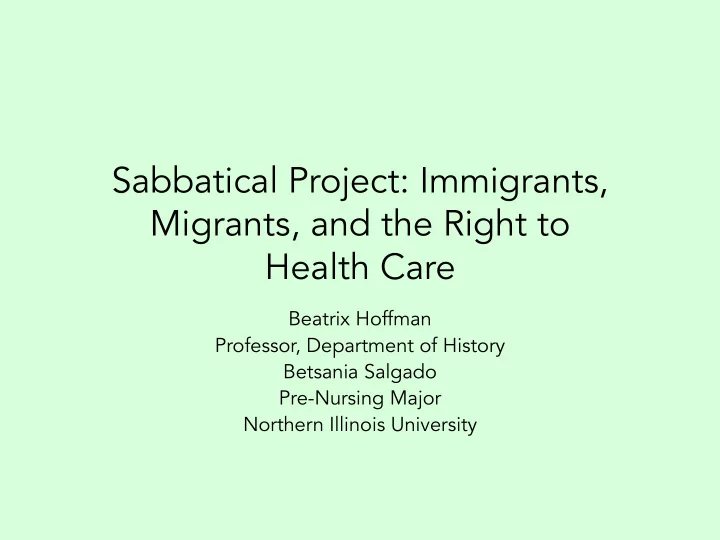

Sabbatical Project: Immigrants, Migrants, and the Right to Health Care Beatrix Hoffman Professor, Department of History Betsania Salgado Pre-Nursing Major Northern Illinois University
Robert Wood Johnson Foundation Columbia Global Center in Paris University of Granada School of Medicine, Spain Andalucian School of Public Health Center for the History of Nursing, UIC Rosen Memorial Lecture, Yale University School of Medicine Keynote Address, American Association for the History of Nursing Loyola Stritch School of Medicine Latino Medical Students Association Physicians for a National Health Program
Meeting with leaders of Latino Medical Students Association
Latinos in the U.S. class, Fall 2015
Visiting Nurse Association of Chicago
DeKalb Migrant Ministry and Nurses Betsania Salgado Department of History, College of Liberal Arts and Sciences, Northern Illinois University Services Provided Role of Nurses Introduction Conclusions As part of a larger project on undocumented • The role of nurses has been vital in health care In the 1970s, approximately 1,300 migrants patients and their access to health care services, The DeKalb County Migrant Ministry created for migrant workers since the early 1960s. worked on DeKalb County farms every year. this research focuses on the role of nurses in successful health education, child care, and The DeKalb Migrant Ministry held migrant health programs. • As part of the federally funded Migrant Health nutritional programs. However, due to limited educational seminars for the community, Program, nurses performed routine checkups funding, they were only able to offer a few health ran nutritional programs for migrant Migrant workers, both documented and and visits, and referred patients for follow-up care services to migrants, such as prenatal care. workers, and provided immunizations for undocumented, are essential to the U.S agricultural care. workers’ children. system. They live under harsh conditions, suffer health problems related to poor sanitation and nutrition, and lack access to health care. Group of Migrant workers posing for a photograph (1960). Nurse performing a routine checkup on infant of migrant worker. Hidalgo Co., Texas Flyer from The Community Educational Seminar A drawing of a Migrant Health Service Referral System Series provided by the DeKalb County Migrant developed by the Florida State Board of Health and the Ministry (1978). NIU Regional History Center Planned Parenthood Federation of America (1963) List of legislation that did not include migrant workers (1970). NIU Regional History Center A nurses’ report and list of recommendations for Migrant Health Program run by the DeKalb Migrant Background Ministry (1966). NIU Regional History Center The DeKalb Migrant Ministry was created in 1970, in order to address the many issues that affected the lives of migrant workers. Acknowledgments Farm workers enjoying meals at migrant center (1979). NIU Regional History Center Booklet provided by the DeKalb County Migrant Ministry. It was given to nurses when Special thanks to interacting with migrant workers (1970). NIU Regional History Center • Professor Beatrix Hoffman, Department of History • NIU Regional History Center Migrant Ministry constitution (1970). NIU Regional History The U.S. Public Health Service Center recommended that nurses use Personal Health Records to keep track of immunizations (1960).
Prenatal and infant clinics have been important sources of care for immigrant women and families
Recommend
More recommend